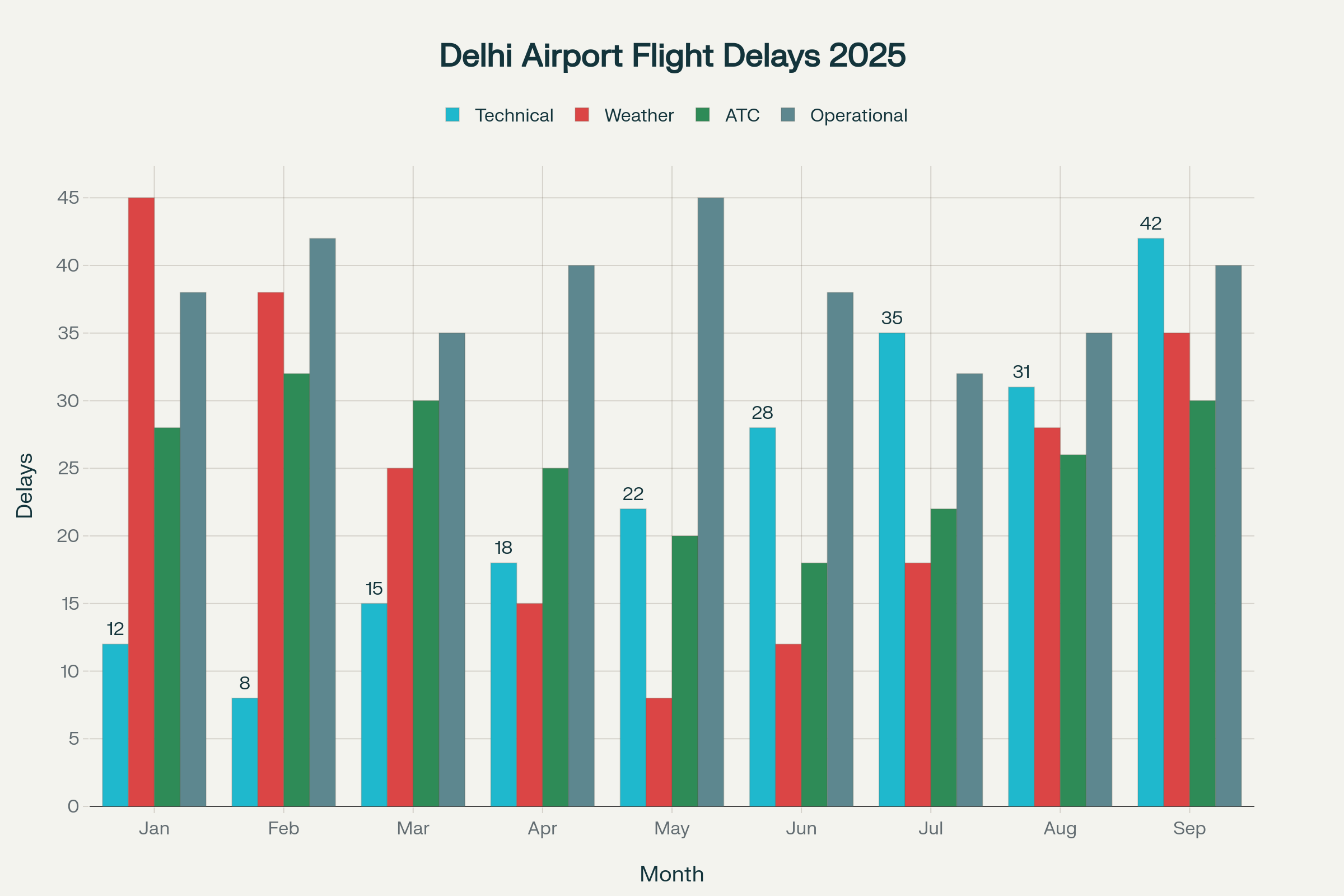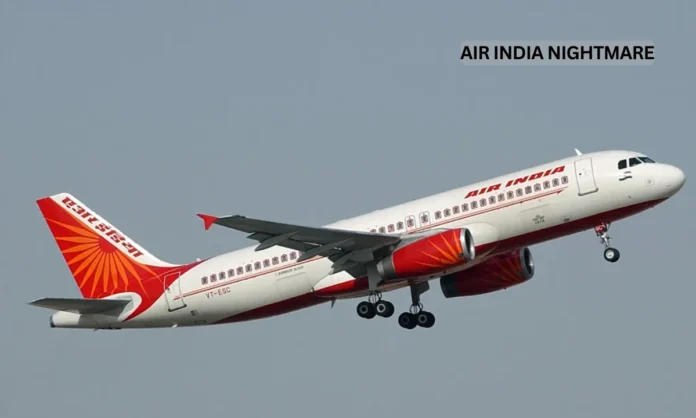Key Highlights:
- Flight AI2380 to Singapore delayed over 6 hours due to faulty air conditioning system on Boeing 787-9 Dreamliner
- More than 200 passengers endured nearly 2 hours inside aircraft with malfunctioning cooling and electrical systems
- The flight eventually departed at 05:36 IST after complete aircraft change, highlighting operational challenges at India’s busiest airport
Air India Singapore Flight Initial Context and Passenger Ordeal
Air India Singapore flight AI2380 experienced a significant technical malfunction at Delhi airport that left over 200 passengers stranded in uncomfortable conditions for nearly two hours. The incident occurred on September 10, 2025, when the Boeing 787-9 Dreamliner aircraft encountered a cabin cooling system failure prior to its scheduled 11 PM departure. Passengers found themselves trapped inside an aircraft with faulty air conditioning and electrical systems, creating distressing conditions that forced many to use newspapers and magazines as makeshift fans.
Air India Flyers Endure Sweltering Nightmare on Singapore Route
— UnreadWhy (@TheUnreadWhy) September 11, 2025
Over 200 travelers aboard Air India's AI2380 to Singapore faced a grueling ordeal at Delhi's airport when a Boeing 787-9 Dreamliner's cooling and power systems malfunctioned. Stuck onboard for about two hours in… pic.twitter.com/MqaIpZo7vD
The Singapore-bound service became a major passenger service challenge as the airline’s crew initially provided no specific explanation for keeping travelers aboard the malfunctioning aircraft. Video footage shared on social media platforms documented the uncomfortable scenes, showing passengers desperately attempting to cool themselves while confined in the cabin. The technical issues highlighted broader concerns about aircraft maintenance and passenger welfare protocols during extended ground delays.
Delhi airport operations faced additional strain as the incident occurred during a period when the airport was already managing reduced capacity due to runway maintenance work. The Air India Singapore flight problems exemplified the cascading effects that technical failures can have on airport operations and passenger experience at India’s busiest aviation hub.
Technical Malfunction Details and Aircraft Systems Failure
- Boeing 787-9 Dreamliner experienced simultaneous failures in air conditioning and electrical systems
- Cabin cooling malfunction created unsafe passenger conditions during extended ground time
The technical issues centered around a critical cabin cooling system failure that rendered the aircraft unsafe for passenger occupancy. Aviation experts note that cabin environmental control systems are essential for passenger safety, particularly during extended ground operations when aircraft depend entirely on onboard systems rather than ground support equipment. The malfunction occurred on a Boeing 787-9 Dreamliner, an aircraft type that has faced various technical challenges since its introduction to commercial service.
Boeing 787 Dreamliner aircraft have experienced recurring technical problems across multiple airlines, with issues ranging from battery malfunctions to engine reliability concerns. The Air India Singapore flight incident adds to a growing list of operational disruptions involving this aircraft model, which has faced manufacturing quality control issues and component reliability problems. Recent data shows that Boeing discovered significant manufacturing defects affecting the 787 series, including problems with fuselage assembly and the use of substandard titanium parts from suppliers.
The delay reflects broader systemic issues with Boeing 787 operations, as airlines worldwide have experienced similar technical problems leading to flight cancellations and passenger inconvenience. Delhi airport has witnessed multiple Boeing 787 technical incidents in recent months, including an Air India London-bound flight that aborted takeoff due to suspected technical issues in July 2025. The Singapore service problems underscore the ongoing challenges airlines face in maintaining reliable operations with this aircraft type.
Air India Singapore Flight Passenger Experience and Airline Response
- Air India provided refreshments and meals to affected passengers during extended delay period
- Complete aircraft substitution required, extending total delay to over 6 hours
The passenger experience deteriorated significantly as the technical malfunction prolonged ground time without adequate cabin climate control. Air India ground staff at Delhi airport attempted to provide support through refreshments and meals, but the extended delay created substantial inconvenience for travelers on the Singapore route. The airline’s initial response to the incident lacked transparency, as crew members failed to provide specific explanations for the decision to keep passengers aboard the malfunctioning aircraft for nearly two hours.
Air India eventually acknowledged the technical problems and issued a formal statement confirming the cabin cooling system failure. The airline’s response to the Air India Singapore flight delay included arranging a complete aircraft change, which ultimately resolved the technical issues but extended the total delay period significantly. Passengers received regular updates about the delay status, though many expressed frustration about the initial lack of communication regarding the severity of the technical problems.
The incident highlighted passenger rights concerns during extended aircraft delays, particularly regarding environmental conditions and safety protocols. Industry regulations require airlines to maintain adequate cabin conditions during ground operations, but the situation demonstrated gaps in emergency response procedures when technical systems fail. The Air India Singapore flight delay ultimately concluded when passengers were successfully transferred to a replacement aircraft that departed at 05:36 IST, more than six hours behind the original schedule.
Delhi Airport Operations and Broader Aviation Safety Context
- Delhi airport handled 79.26 million passengers in 2024-25, making it the 9th busiest airport globally
- Recent DGCA audit identified 51 safety violations at Air India, including 7 critical Level 1 findings
The incident occurred at Delhi airport during a challenging operational period marked by ongoing runway maintenance that has affected daily flight schedules. Delhi International Airport Limited manages approximately 1,450 daily flight operations, making the Air India Singapore flight delay part of broader capacity management challenges at India’s busiest aviation hub. The problems contributed to operational disruptions at an airport that has seen 244% growth in international transit traffic, cementing its position as a major global hub.

Delhi Airport Flight Delays by Category (January-September 2025)
Recent aviation safety data reveals concerning trends for Air India operations, with the Directorate General of Civil Aviation identifying 51 safety violations during its annual audit. The Air India Singapore flight incident adds context to broader safety concerns, as DGCA auditors found seven critical Level 1 safety violations at the airline that could potentially compromise flight safety. Singapore route operations fall under increased regulatory scrutiny following multiple technical incidents involving the airline’s Boeing 787 fleet throughout 2025.
Delhi airport statistics show robust passenger growth, with over 79 million travelers handled in 2024-25, representing a 7.6% increase from the previous year. The delay impact extends beyond individual passenger inconvenience to affect airport-wide performance metrics and operational efficiency ratings. Incidents like this technical malfunction contribute to broader discussions about aviation infrastructure capacity and airline operational reliability at major Indian airports.infra.economictimes.
Industry data indicates that Delhi airport operations face ongoing challenges from both infrastructure constraints and airline operational issues, with the Air India Singapore flight delay representing broader systemic concerns about service reliability. The incident occurred during a period when Indian aviation regulators have intensified oversight of airline operations, particularly following recent safety incidents involving Air India aircraft.
Air India Singapore Flight Final Perspective and Industry Implications
The Air India Singapore flight technical malfunction at Delhi airport represents a significant case study in aviation operational challenges and passenger service standards. The incident involving flight AI2380 demonstrates the critical importance of robust aircraft maintenance protocols and effective passenger communication during technical emergencies. Extended delays of this magnitude highlight the need for enhanced contingency planning and improved passenger welfare procedures during extended ground holds.
The Air India Singapore flight incident occurs within a broader context of increasing scrutiny on Boeing 787 aircraft reliability and Air India’s operational safety record. As Delhi airport continues expanding its role as a global transit hub, the experience underscores the importance of maintaining high operational standards to preserve passenger confidence and airport reputation. The delay resolution through complete aircraft substitution, while ultimately successful, raises questions about maintenance scheduling and fleet management practices that could prevent similar incidents.


